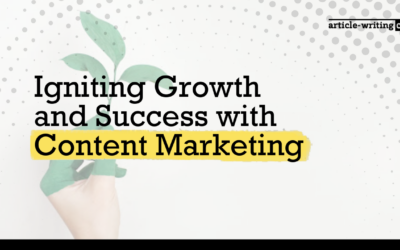Thinking about what to post is one thing, but mastering the art of blog posting frequency takes strategy and a genuine understanding of your intended audience. By posting content regularly, you improve your SEO scores, and garner more organic traffic. Awareness is key for all tech brands.
Additionally, metrics and insights are available to help you see when your visitors most visit so you can target those times for posting content. If you’re unsure how often you should post or promote your content, here’s a friendly guide to get going in the right direction.
Gaining Organic Traffic Requires Consistent Posting
With the right planning and high-quality content, you should consider posting up to six times a week to increase organic traffic for your tech website.
Why is that? Blogging frequently with keyword-laden and easily readable blog posts ensures that you boost your search engine optimization (SEO) scores, putting you on the front page of Google’s search results.
If you’re a smaller blog with a small team, it can be harder to come up with blog post ideas and promote content daily. With smart planning, however, you can change that. Set aside some time to detail how the posts will look. By outlining and organizing your material before writing, as well as breaking down your topics, it’s easier to structure your content and produce it in earnest, so you’re able to post consistently.
Smaller tech blogs should aim for three to four postings per week, while bigger tech blogs should target the 4-6 weekly postmark, especially considering the competitiveness of the tech industry. After optimizing the planning process, you’ll find it easier to meet these targets.
Plus, if there’s specific content that readers gravitate towards, then you can leverage those posts to create related content. With the related content, you can link it back to your previous posts on the content you’ve previously written about, garnering you added website traffic while reducing your bounce rate.
Blog Posting For Brand Awareness
Blog posts for brand awareness are more promotional and specialized, not intently focused on generating increased traffic. However, with such content, leaders of tech brands should consider diversifying the content as much as possible while also providing useful information.
For brand awareness posts, smaller blogs should aim for one or two new blog posts a week, while larger blogs can plan for four new or updated posts weekly. These blog posts are building a voice for tech brands and aren’t particularly topic-focused.
However, as you’re still providing useful information to your audience, you should diversify the content you’re producing for your tech audience. Creating brand-focused infographics and statistics related to your products/services or the industry position, you’re higher in your marketplaces, showing you as a thought leader who wants to be a go-to voice within the tech industry.
Set Your Goals For Blogging
Make sure that you map out your goals for your blogging before you start creating blog posts focused on a topic, one of your tools, or the brand.
Are you trying to boost your traction in search engine results pages (SERPs)? Is SEO a priority? And are you trying to gain industry clout with your content? If the answer is yes to all those questions, then you can properly plan your posting and add more posts with quality information so you become a strong reference within your niche.
By establishing a relationship with Article-Writing.Co, you will get more of the nuances and quality tips you need to elevate the features of your tech brands and become the envy of competitors everywhere. Reach out to our blog writing experts, and let’s improve your content creation capabilities to make your brand the best!
Interview with Paul Claxton, Serial Entrepreneur
Paul Claxton is a serial entrepreneur, VC in AI. He was featured in San Diego Business Journal as a 40 under 40 finalist along with other important business leaders from California. Paul talks about robotics, innovation, venture capital, and artificial intelligence on his LinkedIn.
Thanks for being here, Paul. I appreciate your time, so let’s jump right into it! Could you walk through how your company (ReciprocityROI) uses technology to benefit other companies?
We use our technologies to help bring people, product and innovation together. We live in a technology driven world, but people are the glue that hold all of the technology together and make things possible and manageable. That being said, the war on talent in the technology community is an ever – growing need due to skills gaps which are significantly outpaced by the growth of self-reliant and individually capable technologies. Where there are no skills gaps, demand for talent remains high with supply remaining quite low.
So we can see that in the market there is quite a gap in talent between the haves skills and the have not skills. This is why we built our business subsidiary, Empire Headhunters, to help alleviate skills gaps through some of our technology certification programs and partnerships with universities. Empire Headhunters also helps companies compete in for talent in low supply skills sectors by using our proprietary business intelligence tools to gather deep actionable insights, locate and predict talent at the right time and in the correct market across multiple industries and geographies based on trending events, information and relationships.
Empire Headhunters is a full-suite recruitment agency which focuses on intern to C-level recruitment and training. We offer some of the top 1 percent of talent in the market with various human capital offering methods such as project outsourcing, staff augmentation, and permanent placement recruitment solutions. As Steve Jobs said “ It’s not faith in technology, it’s faith in people.”
Awesome! I love how your company really focuses on using tech to fuel the human aspect of business and move away from transactional relationships. Would you say there is a connection with what we do at AWC? Specifically, organic marketing with content like blog posts and articles intended to resonate with the audience.
AWC focuses heavily on thought leadership, so I would say yes there is a connection. Honest, pure, objective and subjective thought leadership is so important because we live in a world of options and confusion. We definitely need more thought leaders providing direction in an increasingly complex virtual world where a greater and greater percentage of interactions are not face – to – face. Organic marketing and online mediums are one of the many great ways to connect with expansive audiences.
Do you believe that this type of high-value and personalized content can be a big help in driving engagement, and ultimately, building loyalty and long-term connections?
Yes. One of the first things people do when they consider the credibility of you or your business is through an online search. That being said, building long-term connections starts with online trust through personal/organizational relevant content. Some of the best brands in the world do billions every year simply because they build trust through online marketing, not because they have a great product, but because they built a great brand through organic and other marketing avenues.
As a tech entrepreneur and thought leader, would you agree it makes long-term sense, even for small businesses, to build a consistent content strategy and organic marketing game plan? How do you envision it would impact that business?
Yes I agree, your business will be successful not because of what you do today, but because of what you did 5 or 10 years before and the relationships you built over that time whether it be through relationship networking or marketing. Long-term marketing is not a one-time effort, but it is a series of positive efforts compounded overtime. All of these efforts repeated day after day, year after year have a long-term impact on exposure for the business, like Google search results and intended audiences being able to find you online.
Business is all about relationships, no matter how much technology we may have. At the end of the day we are serving people, people buy our products and services. So if you don’t know anyone, and no one knows you, then I cannot even say “good luck” with a conscience because good luck won’t help you if you do not know anyone. In today’s business which is a highly virtual world, the only way for people to know you and for you to know them is to get out there and market and network.
Business development takes on many forms, but by itself it is only a car with an engine and transmission.
You can’t just have business development; you need marketing to support sales and drive it. Marketing supports pre and post- sales efforts for a thriving organization. Think of marketing like a sandwich; sales would be the meat and marketing would be the bread. Without the bread you would have no sandwich, and no one wants that!
People do not buy products because they are good or bad, they buy brands, brands who market, but you have to do it consistently over time.

David is the Founder and Director of article-writing.co, the fastest-growing content creation agency in North America. He has transformed companies by offering high-quality content that has impacted their SEO ranking, revitalized websites with engaging and industry-relevant blogs and website copy, and championed successful email campaign copy.






